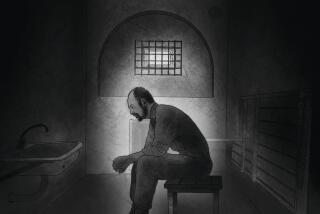Remarkable Expose in Party Publication : Soviet Paper Decries Psychiatric Abuses
- Share via
MOSCOW — Arbitrary diagnosis, abuse of power and bribery have tainted Soviet psychiatry, and a citizen can be ruled insane simply for not kowtowing to employers, a Soviet daily said Wednesday in a remarkable expose for the state-controlled media here.
“Psychiatric science and practice have long ago been shut off from openness by a high and solid fence,” the Komsomolskaya Pravda newspaper said.
“Behind the fence, there is lawlessness,” it added.
The paper’s six-column article was the longest on psychiatric abuses to appear in the state-run press yet and was clearly linked to the current campaign for glasnost, or greater openness on social problems.
Due to the arbitrary way Soviet patients are now diagnosed, the paper said, “the same person can be recognized as a schizophrenic in Moscow, a psychopath in Leningrad and healthy in Kharkov.”
Although Komsomolskaya Pravda’s article was groundbreaking by Soviet standards, it made no reference to charges by human rights activists and Western groups that psychiatric hospitals are used to warehouse political prisoners.
In the past, some of the most serious charges of abuse of psychiatry in the Soviet Union were leveled by psychiatrist Anatoly Koryagin, 48, who was sentenced to a labor camp in 1981 for his accusations. He was released last February and allowed to emigrate to Switzerland.
On Oct. 29, Koryagin addressed the Royal College of Psychiatrists in London and said the Soviet Union withdrew from the World Psychiatric Assn. in 1983 to avoid the humiliation of being suspended or expelled for using the science against political prisoners.
Vladimir Titov, a former political prisoner, was released from a psychiatric hospital last month. He told reporters Oct. 20 that at least a dozen hospitals throughout the country hold people convicted of political offenses.
Heavy Medication
Prisoners in such hospitals are subjected to heavy medication, poor food and unhealthy living conditions, Titov said.
Komsomolskaya Pravda said a 20-year-old Leningrad resident, Marina Pristavka, was forced into a mental hospital by the management of the factory where she worked, with the help of corrupt doctors.
Pristavka was condemned for her efforts to work honestly and her criticism of management for its indifference to the needs of workers, according to the paper, an organ of the Communist Youth League.
“She reads too much Marxist-Leninist literature,” her trade union boss, Vladimir A. Kozlov, was quoted as saying.
According to Komsomolskaya Pravda, two schools of Soviet psychiatry exist, with the Leningrad school founded by Prof. I. F. Sluchevsky giving a narrower definition of schizophrenia than the Moscow school.
In its 1985 “Psychiatrist’s Handbook,” the Moscow school lists so many symptoms of that illness, including an interest in philosophy, art and religion, that virtually any sane person can be found to have “creeping schizophrenia,” the paper said.
Bribes have been accepted by psychiatrists to send criminals to hospitals, and the problem has reached such a scale that a task force has been set up in the Moscow prosecutor’s office to investigate corruption in psychiatry, the paper said.
It quoted investigator I. Kozlov as saying: “You talk to a psychiatrist who is a proven bribe taker for false diagnoses, and he says, ‘I still consider the patient insane, that is the school I belong to.’ ”
Conditions are bad in many psychiatric hospitals, the paper said. It quoted a letter from one hospital as saying patients were forced to perform filthy jobs and that doctors and nurses do not attend to patients, leaving them to orderlies.
More to Read
Sign up for Essential California
The most important California stories and recommendations in your inbox every morning.
You may occasionally receive promotional content from the Los Angeles Times.













